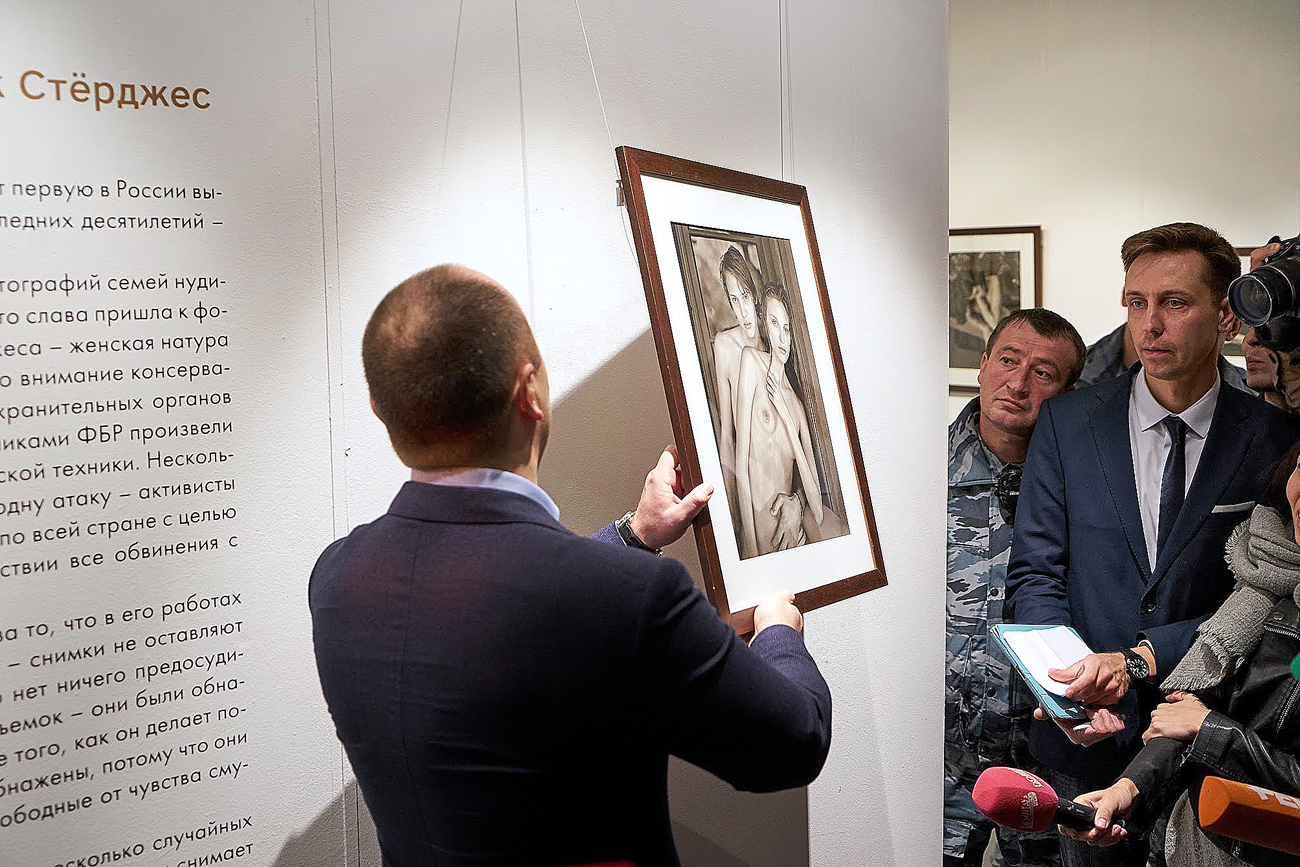
Head of the Commission on Security of the Public Chamber of Russia Anton Tsvetkov in the Lumiere brothers Moscow Center of Photography during the scandalous Jock Sturges's photo exhibition.
KommersantSeveral of Russia’s prominent cultural figures have made public statements condemning what they see as growing interference in the sphere of arts and culture by religious and conservative activists, describing what is happening as “harassment,” “censorship” and “orders” from the powers that be.
Speaking at the seventh congress of the Russian Union of Theater Professionals on Oct. 24, the head of Moscow’s Satirikon theater, actor and director Konstantin Raikin, urged everybody “to unite against attempts to curtail creative freedom.” His address expressed the opinion of many people and triggered a heated public discussion.
For several years now, debate has been raging in Russian society about the influence that religious and conservative activists have been exercising in the sphere of arts and culture. Under the pretext of speaking for all people or representing the position of the state, aggressively-minded traditionalists vandalize art exhibitions and disrupt theater performances that they find objectionable. The authorities do not sanction those actions, but nor do they punish the perpetrators, citing the need to respect believers’ feelings.
Raikin’s comments are epitomized by a recent high-profile incident in Moscow, in which an exhibition of work by American photographer Jock Sturges, famous for his nude images, was forced to shut down after a public outcry over accusations of pedophilia.
An activist belonging to the pro-Kremlin public movement Serb poured smelly yellow liquid, presumably urine, on the photographer’s “provocatively pedophiliac” works, while volunteers from the patriotic organization Officers of Russia, dressed in uniforms resembling those of special-purpose police, created a live shield around the exhibition venue. This was only the latest in a string of similar incidents in which conservative activists sought the closure of (see box).
According to Raikin, art exhibitions and theater productions are banned in Russia on instigation from a small group of people affiliated with the authorities and the church under the guise of fighting for morality, patriotism and other lofty notions. These people “behave in a very brazen manner,” says Raikin, while the authorities “are strangely neutral” about then.
“Can’t we all speak out together? … One should not pretend that the authorities are the only carrier of ethics and morality. It is not so,” the director concluded.
Two days later, writing in the influential business newspaper Kommersant, acclaimed film director Andrei Zvyagintsev supported Raykin’s point of view. A year earlier, Zvyagintsev’s award-winning feature film Leviathan about life in the Russian provinces and corrupt officials had come under criticism from defenders of Russia’s unblemished image.
The position of the state at the time was expressed by Russian Culture Minister Vladimir Medinsky, who said that he saw “no point” in making films funded by the Culture Ministry that smear the elected authorities. “I mean those who make films under the slogan ‘Shithole Russia.’ What for? It would amount to state masochism,” he said.
Zvyagintsev used his Kommersant article to respond to the minister’s objections: “Can you name a single opera theater or at least a dozen feature films created without state support? The situation in our economy and culture at the moment is such, that there are none,” he wrote.
Does this mean that if the state pays the artist, then “the artist must serve the will of the state?” wondered Zvyagintsev. “It is amazing how easy it is to substitute one notion for another. Nobody even bats an eyelid. We say: ‘It is censorship,’ they say: ‘It is a state order’.”
Konstantin Raikin’s emotional appeal against state pressure on the arts has provoked a lively reaction from the opposite camp, as expressed by the leader of the Night Wolves biker club, Alexander Zaldostanov, aka ‘The Surgeon,’ known for his friendship with Russian President Vladimir Putin.
“Under the pretext of freedom, these Raikins want to turn the country into a gutter for sewage,” he said. Kremlin press secretary Dmitry Peskov sought to defuse tensions somewhat and urged the biker to apologize to the Satirikon director.
He also reiterated the position of the state: Censorship per se is unacceptable, however “if the state allocated funds for a production” and “commissions a work of art,” it is entitled to “set this or that theme.”
“In a nutshell, if the state thinks that smoking is bad, then the state has the right to say that a film that it funds should not contain any smoking. Can this be called censorship? No, it can’t,” insisted Peskov.
All rights reserved by Rossiyskaya Gazeta.
Subscribe
to our newsletter!
Get the week's best stories straight to your inbox